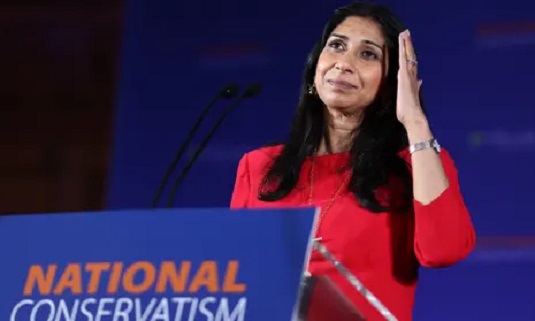
Apart from Rees-Mogg casually admitting that the government's voter ID scheme was a "gerrymander", interest alights upon Braverman's speech. It wasn't particularly original. More a "greatest hits" of material reminding us why Rishi Sunak employed her in the first place. She attacked the left for spreading pessimism and division, and for demanding that Britain should apologise for its past. "Don't they know we abolished slavery?" she said, while neglecting how it was aggressively maintained by the UK and its predecessor states for centuries, financing its wars of conquest, and providing the capital for the industrial revolution. She attacked the concept of white sin and said no one is guilty of what happened before they were born. True, but when the state and the class enriched by slavery is still with us and finds plenty of defenders wanting to bury Britain's real history, one might suggest those playing down historical crimes believe they are some way responsible for them. Otherwise they might not get so exercised.
Braverman droned on. We heard about the left's authoritarianism, of how the critique of inequality inevitably leads to the suppression of freedom. Just don't talk about Tory protest laws. She had a go at the politics of grievance with all the chutzpah of a Tory on manoeuvres. She pivoted toward the anti-expert ranting of Margaret Thatcher, saying we should be sceptical of "self-appointed gurus, experts, and elites", while speaking at a conference of self-appointed gurus, experts, and elites telling Britons how their lives should be lived. And, hilariously, she warned against pitching the country into a US-style culture war. Not because they're bad in and of themselves, but because they might turn conservative against conservative. Which, of course, won't stop her victimising the groups the Tories just love to victimise.
Today's NatCon conference might as well have dubbed itself the launch of Braverman's leadership campaign. However, unlike Priti Patel who did her star turn at Saturday's Conservative Democratic Organisation gathering, the Home Secretary's record is not as spotless as her putative rival. While Patel affected support for the dear departed Boris Johnson at the time, Braverman - you might remember - announced her decision to stand in the contest to replace Johnson before he had resigned his office, and called on him to go as he clung on for dear life. There will be Johnson fans among the Tories who haven't forgot what they see as her cowardice, and as limited as Braverman is she has enough self-awareness to know her past behaviour could be a barrier to her ambitions. Therefore the BNP-adjacent posturing on all issues is not an expression of deep conviction, but as per all political sociopaths a function of her careerism. Going extreme is overcompensating for plunging the knife into Johnson and works as a big attract sign in the hope her previous inglorious moments slip from the collective mind. Whether it works or not we will have to see when the post-Sunak leadership election swings round, but one thing's for certain. With her and Patel vying for the top job, the political tone of the competition will mark a new low in the history of the Conservative Party.
Image Credit
5 comments:
Here's the thing: obviously white people don't have a monopoly on racism, but fucking hell, does it not occur to Suella Braverman that the precise form of racism that she is pushing, (white-) British nativism, will definitely affect her and her family? Does she not get that?
@JN I reckon that Braverman (and many others like her) realise they've done very well from integration, far better than if they'd not immigrated. She's banking on any blowback landing on those who haven't integrated that well, particularly those who feel perpetually aggrieved and entitled as a consequence. There is a danger of falling into the same faulty thinking as Diane Abbott recently; ignoring that ethnic minority experiences and their sectional interests vary significantly.
@Phil I have little time for JRM and his pseudo-Edwardian pretences, but he's not wrong to claim "tackling climate change will make people poorer". Anyone with the most basic grasp of economics understands this. The vast investments required to achieve things like "net zero" and the relative reduction in utility and wealth that come as a consequence will truly make people poorer. Whether you agree or support such actions is an entirely different matter. It's always struck me as intellectually dishonest that groups like XR and Stop Oil gloss over that what they set themselves in opposition to underpins their very existance.
Also, "National Conservatism", could you come up with a phrase that sounds more like a euphemism for fascism?
She has the same right to be a racist as anyone else.
Apart from the usual "racism here, racism there, racism everywhere" attitude this is an interesting point on a different topic:
«The vast investments required to achieve things like "net zero" and the relative reduction in utility and wealth that come as a consequence will truly make people poorer. Whether you agree or support such actions is an entirely different matter.»
The key word here is "people" because the use of such generic terms (other example: "country", "national interest", "middle class") often obscures the distributional impacts of policies.
In the topical case, some people will become poorer, and some people will become richer, depending on period of time, geographical location, class situation.
For example (a still too coarse) argument that the "climate change" maniacs can do, and some more honest ones do, is that "people" today ought to pay a price by becoming poorer so "people" tomorrow can be richer than otherwise they would be, thanks to investments today to mitigate the consequences of climate change tomorrow.
As to geographical distributional impact some countries (and regions within them) may well be devastated by climate change (some will become desertic or even more desertic, some will become colder or much colder), and some will have nicer, milder climate.
Post a Comment